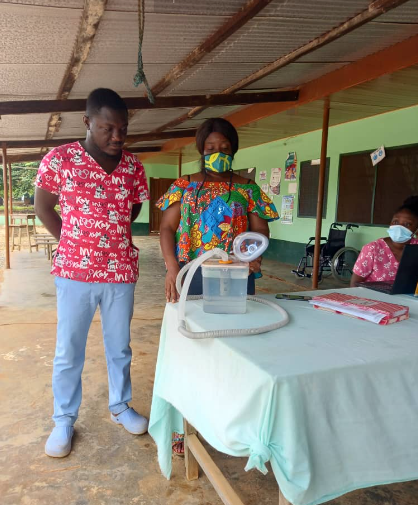SMALLWOOD DEVICE
Original development and early usage write-up

EARLY HISTORY OF CONCEPT FOR 4GBI
An inexpensive, simple to use respiratory assist device was developed to save the lives of a patients in West Africa experiencing acute respiratory distress. The device is designed to work even in rural clinic lacking reliable electricity or access to physicians.
Introduction:
Respiratory disease is endemic in West Africa due to wide-spread prevalence of household smoke and environmental dust. For instance, in Ghana, respiratory diseases and tuberculosis represent the second leading cause of death, responsible for 9% of DALY (disability-adjusted life years) lost from all causes. Prior to the pandemic, it was estimated that nearly 10% of critically ill patients presenting to an emergency department in Ghana required ventilatory support. Poorly resourced rural Health Clinics have no way to restore blood oxygen levels in patients experiencing life-threatening acute respiratory distress. There are fewer that 200 functioning ventilators in Ghana, a country of over 30 million people. These units are predominantly in large urban centers and the vast majority of the people in West Africa have no access to them.
Existing devices (e.g ventilators and similar systems) for restoring blood oxygen levels in patients experiencing acute respiratory distress are prohibitively expensive, difficult to maintain and impossible to use by non-physician health care workers who constitute the bulk of healthcare workers in rural West Africa. This leaves a huge unmet need for treatment of patients experiencing respiratory distress.
To address this need, we designed, built, and tested a simple expiratory positive airway pressure (EPAP) device to provide adult respiratory support in low resource environments with or without supplemental oxygen and without the need for electricity (Djagblatey et al, 2022 Ann Thorac Surg;113:1021-5). Laboratory tests demonstrated that the device is capable of delivering EPAP at levels expected to provide substantial benefit to patients suffering from respiratory distress. It can be used to deliver appropriate levels of EPAP in a low-resource setting with limited infrastructure. To establish broader application of this device in low-resource settings further clinical validation is needed. We are initiating a pilot study to collect the clinical data required to support the broad deployment of this device in rural West Africa.
In particular, we intend to:
(i) Carry out a pilot program to evaluate the efficacy of this EPAP device to mitigate respiratory distress in a broad population of patients presenting with a range of respiratory diseases. To do this, we will produce and distribute devices to ~ 100 rural health clinics in Ghana; train the resident non-physician healthcare workers in these clinics to(i) recognize patients who could benefit from EPAP and (ii) appropriately use the device on patients experiencing respiratory distress. Data on the use of the device on a broad range of patients will be collected to document the ways in which it can most effectively be used and to act as a foundation for commercial development and deployment of the device at a large scale.
(ii) Implement any necessary refinement of the device as guided by the data collected in the pilot program. Establish a partnership with a commercial manufacturer to scale up production and distribute this device to rural health clinics – initially in Ghana and eventually throughout West Africa. There are approximately 4500 community health planning and service centers (CHPS) and village health clinics in Ghana. Ghana represents somewhat less than 8% of the population of West Africa (roughly 33 million out of 430 million). Therefore, we can anticipate that there may be as many as 50,000 rural health care clinics in West Africa whose patients could benefit from access to an EPAP device.
(iii) Deployment of the EPAP device will be done in coordination with training programs for relevant healthcare workers to recognize patients who could benefit from the device and how to use it. This commercial expansion will be monitored to further determine the ways that it can best provide benefit to patients suffering from respiratory distress due to a wide range of respiratory ailments.

